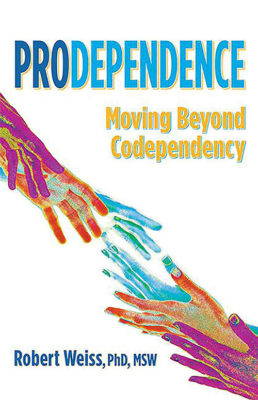When I first joined forces with the Seeking Integrity team, I was sent and encouraged to read Dr. Robert Weiss’s newest book, Prodependence. I was busy, so downloaded the Audible. After the first time through, I was so impressed with the potential implications for female recovery that I went back and listened again. Twice. If you don’t have it, get it.
The concept of prodependence came from Dr. Weiss’s concern for the tendency of modern psychology to pathologize well-meaning family members with the weighty label of “co-dependent.” I share his concern, as do many other professionals in the mental health and life coaching fields. No other viable option has been available until now, though.
Within the prodependent framework, there is no shame directed at spouses and other lovey77d ones of those who are love addicted or otherwise addicted. In fact, their concern is celebrated, encouraged, and met with reassurance. The language of prodependence is that of empowered learning. Instead of asking, “How are you further damaging yourself, your addicted loved one, and acting out your own trauma,” prodependence asks, “What support and education can we give you to empower your own healthy boundaries and healing, while also supporting your concern for the recovery of your loved one?”
While prodependence is intended to address concerns of family members, in the spirit of proactive growth, I want to share a few suggestions for women in recovery. The learning and personal empowerment of these “prodependent recovery” examples will naturally model a healthy, connected pattern for all people recovering women encounter—including their formerly love- and sex-based encounters.
Example One: Michelle
Let’s say Michelle is troubled by a relationship at work. A fellow employee has been making flirty comments to Michelle and has invited her out for drinks after work in a few days. Michelle is married, and this co-worker is engaged. And while Michelle is flattered, she is also in recovery for sex and alcohol addictions that nearly ruined her marriage this time last year. She does not want to be unkind. Her job is fulfilling, offers the flexible hours she needs, and is only a few blocks from home. Because Michelle wants to keep things friendly at work, she is torn. A year ago, she would have made up an excuse about being home late and just gone to drinks. She would have dealt with the consequences, if any, later. But now, recovery and her own integrity are important to her. So, she calls her AA sponsor and sets up a call to talk to a woman from her Tuesday night women’s love addiction recovery meeting. After talking to both women, Michelle sees a few options.
- Clearly turn down the advances from this co-worker and discourage any future attempts at romantic or overly friendly engagement.
- Agree to drinks “just this once” and start over with her AA “Day 1” the next morning. Maybe she won’t mention the meeting to her group unless she can’t keep the meeting from becoming sexual.
- Avoid this co-worker at all costs and hope he gets the hint or loses interest.
- Tell HP about the advances and let them handle it.
- Use what she’s been learning from a book called “prodependence” that someone recommended to her husband and that she has also read.
Michelle decides to talk to her husband and ask for his ideas, based on what they have both been learning by reading this book together. He encourages her to set clear, direct boundaries with this co-worker. Michelle talks through what she will say, then checks in about it with her sponsor and her group. She and her husband also decide to have lunch together in the cafeteria where Michelle works a couple of times a week. This will give Michelle a chance to connect with her husband more often, which she needs. It will also give her the opportunity to introduce him to others at work, which she has wanted to do for a while. Finally, it will send a clear message to this co-worker about Michelle’s relationship with the man she married. She can then back up her boundaries with actions in a way that focuses on her priorities instead of leaving her vulnerable during her lunch hour, which is when this co-worker often corners her for her attention.
Nothing in this scenario is about being unkind, self-righteous, or vague. It is all about what Michelle and her husband can do to solidify their relationship. This solidarity is a key factor in the healing they are working on together. It has already proven protective for Michelle, as she knows how important her recovery is to her husband. He knows she will be honest, and that any hiccups will be addressed as they learn together what it takes to keep their marriage strong.
Example Two: Adrienne
Adrienne is the single mom of a 14-year-old daughter. Adrienne is also trying to quit pornography and masturbation addictions that have plagued her since she was about 15. She worries constantly about her daughter falling in to the same patterns—or worse! Her daughter, Alexa, is dealing with depression and an anxiety disorder. At least once a week, Alexa either cannot get out of bed or needs to be picked up from school early because of her anxiety. Getting further behind in school stresses her out more, and she shuts down. This shutdown triggers a depressive episode, leading to more missed school and arguments with her mom. Adrienne then uses porn and masturbation to calm herself down and fall asleep. She knows it is just making her feel worse, but is at a loss.
One night, Adrienne decides she will resist acting out, even if it means staying up all night. Alexa will probably refuse to get up for school anyway, so who cares? Adrienne remembers a recent conversation about prodependence, and how she could use it with Alexa. She sits down to journal her frustrations and brainstorm some ideas. After a couple of hours, Adrienne is ready to give something new a try. Her journaling session gave her enough clarity to realize she is only so frustrated at her daughter because she wants Alexa to have a better life. She wants Alexa to succeed, find a career path that will support her into adulthood, and even make her happy. If Alexa wants to go to college, Adrienne knows she will need scholarships and grants. That means her daughter needs decent grades.
With this clarity, Adrienne develops a new plan, and decides to use her worry as a reminder to get her daughter back to the psychiatrist for a meds check. Someone told her about a great therapist, too. Maybe it is time for family therapy and outside support to help this mother-daughter pair communicate better. After all, Adrienne grew up in an abusive home. Education on how to be a supportive mom without being “too much” (as Alexa constantly shouts) would be good for both of them. Adrienne lays down to try to get a few hours sleep before getting up to make appointments first thing in the morning. She’ll let Alexa sleep in and brainstorm ideas with her daughter after they have both had a good night’s sleep and late brunch. They both need time to make changes, and Adrienne is finally ready to do whatever it takes to learn to be the mom Alexa deserves.
The focus of prodependence in recovery is on relationships. It is about healing, learning, shifting, and recovering what was lost. This all takes place a little at a time, with internal work and relational practice. Mistakes are made, we might try too hard to change too much all at once. But we can regroup and try again. Error and trying again are part of the process.

